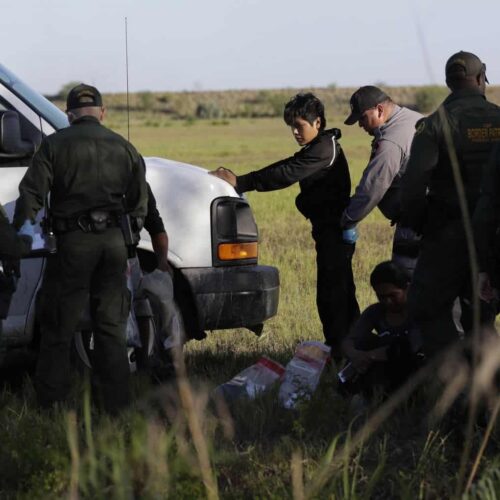Introduction
Attorney General Jeff Sessions vowed Monday to prosecute “100 percent” of illegal border crossings, put more migrants in prison and separate parents seeking asylum from children while they wait for hearings.
But Sessions’ “zero-tolerance” vows could meet fiscal restraints and multiple legal challenges, according to Doris Meissner, who was commissioner of what was called the U.S. Immigration and Naturalization Service during Bill Clinton’s presidency. Immigration judges are already protesting new quotas the administration wants to impose on them to speed up adjudication so people who lose asylum or other claims can be deported faster.
Moreover, Meissner argued in an interview, Sessions’ rhetoric represents a style of leadership that doesn’t air the complex realities of immigration—even as Trump has pushed the issue onto center stage politically.
There has been little talk from the administration, for example, about U.S. businesses’ concerns about Trump’s crackdown on undocumented immigrants.
Many leaders in immigrant-rich states and business organizations have called on Congress for years to legalize longtime undocumented workers and immigrants who’ve been living here under temporary protections, as the Center for Public Integrity has reported. But Sessions and Trump have embraced and spread a disputed argument that immigrants—legal immigrants—drive down Americans’ wages, despite economists’ counterarguments.
“Nobody in a leadership position is prepared to talk straight about immigration to the American public,” said Meissner, now a senior fellow at the Migration Policy Institute, a bipartisan organization in Washington, D.C. that studies policy impact. “Quite the opposite. There’s a will to return to it again and again, exploiting it.”
Meissner called Sessions’ language Monday about a “stampede” at the border “overheated.” “There is a border challenge today,” she said. But the reality is that border crossings have fallen dramatically over time.
Federal authorities have historically used their discretion to urge first-time crossers who are caught to voluntarily deport—and avoid lengthy detention—rather than attempting to prosecute every single one. Prosecuting everyone could strain the financing of courts and detention space, she said.
Trying to separate children as a deterrence to crossers is “a very harsh measure,” Meissner said. She predicted that officials will follow through and continue to separate children, as they’ve already done. But advocates for immigrants have already challenged and will continue to challenge this blanket strategy, she said. The American Civil Liberties Union has filed suit on behalf of a Congolese asylum seeker who was separated from her 7-year-old daughter for months and a Brazilian who was separated from her 14-year-old son.
Today, with a plunge in overall border crossings, the flow of migration is dominated by Central Americans attempting to seek asylum from organized crime or other threats. While it’s true that many migrants don’t qualify and that there is coaching by some smugglers to try claims, Meissner said, there are people from Central America who do end up winning asylum after they submit to proceedings.
“Our job is to sort through the cases and get on with it as best as we can,” Meissner said. “Some people indeed are eligible for asylum and others are not.” The U.S. is bound by international treaties and its own commitments under law to hear out asylum claims—which people do within a system designed for both adults and minors, as the Center for Public Integrity has explained.
Many of those showing up at the border and asking for asylum describe how gangs threaten them with extortion and death is they don’t hand over money or comply with other orders.
Some also have family members in the United States—the result of years of Cold War-era civil wars that people fled and grinding poverty. The United States took sides in these conflicts during the 1980s by supplying billions of dollars in military hardware and training to defeat leftist insurgents battling regimes benefiting oligarchs.
On Monday, Sessions said: “I have no doubt that many of those crossing our border illegally are leaving difficult situations. But we cannot take everyone on Earth who has a difficult situation.”
On Tuesday, the Washington Post reported that senior U.S. diplomats warned against the Trump Administration’s decision to end Temporary Protected Status for 300,000 immigrants from Central America and Haiti who’ve been here for years. The diplomats warned that the countries were too fragile too absorb so many people who’ve lived in the United States legally for as long as 20 years—and who’ve been raising families, working, starting business and buying homes.
Meissner said that forcing so many to leave would deplete certain American communities of workers, such as Houston, where Central American workers are involved in rebuilding after Hurricane Harvey. She said that stripping workers of legal status could end up with U.S. businesses hiring people who have been turned into undocumented immigrants. “These are questions everybody is going to have to ask,” she said.
The Migration Policy Institute on Tuesday released a report on the impact of Trump’s immigration enforcement in the interior of the United States. “Revving Up the Deportation Machinery” found that policies have driven a wedge between local police and immigrants too afraid to report crimes, and reduced business revenues in some areas with immigrant communities. Some states, such as California, are taking strong positions to defend immigrants without criminal records from deportation, providing money for legal services to assist immigrants.
Read more in Inequality, Opportunity and Poverty
Immigration Decoded
Commentary: Trump’s immigration blame game
Migrants have long assumed costs, risks of border crossing—but Trump’s finger pointing now adds to the burden.
Immigration Decoded
ICE failed to penalize contract immigrant jails with thousands of safety and rights violations
Federal watchdog says contractors failed to report sexual assaults and staff misconduct to ICE investigators.


Join the conversation
Show Comments